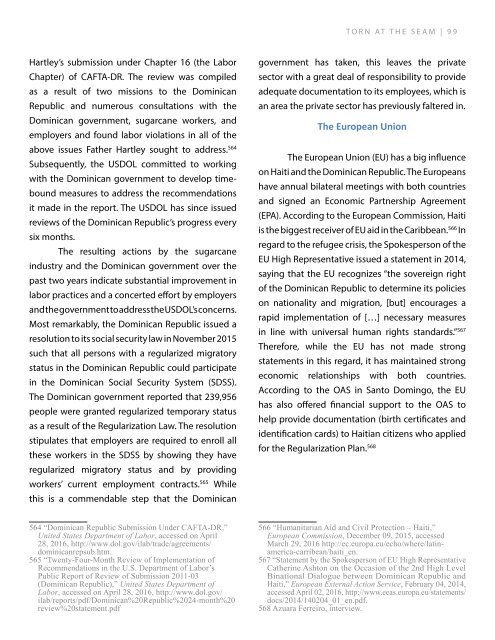Create successful ePaper yourself
Turn your PDF publications into a flip-book with our unique Google optimized e-Paper software.
<strong>TORN</strong> <strong>AT</strong> <strong>THE</strong> <strong>SEAM</strong> | 99<br />
Hartley’s submission under Chapter 16 (the Labor<br />
Chapter) of CAFTA-DR. The review was compiled<br />
as a result of two missions to the Dominican<br />
Republic and numerous consultations with the<br />
Dominican government, sugarcane workers, and<br />
employers and found labor violations in all of the<br />
above issues Father Hartley sought to address. 564<br />
Subsequently, the USDOL committed to working<br />
with the Dominican government to develop timebound<br />
measures to address the recommendations<br />
it made in the report. The USDOL has since issued<br />
reviews of the Dominican Republic’s progress every<br />
six months.<br />
The resulting actions by the sugarcane<br />
industry and the Dominican government over the<br />
past two years indicate substantial improvement in<br />
labor practices and a concerted effort by employers<br />
and the government to address the USDOL’s concerns.<br />
Most remarkably, the Dominican Republic issued a<br />
resolution to its social security law in November 2015<br />
such that all persons with a regularized migratory<br />
status in the Dominican Republic could participate<br />
in the Dominican Social Security System (SDSS).<br />
The Dominican government reported that 239,956<br />
people were granted regularized temporary status<br />
as a result of the Regularization Law. The resolution<br />
stipulates that employers are required to enroll all<br />
these workers in the SDSS by showing they have<br />
regularized migratory status and by providing<br />
workers’ current employment contracts. 565 While<br />
this is a commendable step that the Dominican<br />
government has taken, this leaves the private<br />
sector with a great deal of responsibility to provide<br />
adequate documentation to its employees, which is<br />
an area the private sector has previously faltered in.<br />
The European Union<br />
The European Union (EU) has a big influence<br />
on Haiti and the Dominican Republic. The Europeans<br />
have annual bilateral meetings with both countries<br />
and signed an Economic Partnership Agreement<br />
(EPA). According to the European Commission, Haiti<br />
is the biggest receiver of EU aid in the Caribbean. 566 In<br />
regard to the refugee crisis, the Spokesperson of the<br />
EU High Representative issued a statement in 2014,<br />
saying that the EU recognizes “the sovereign right<br />
of the Dominican Republic to determine its policies<br />
on nationality and migration, [but] encourages a<br />
rapid implementation of […] necessary measures<br />
in line with universal human rights standards.” 567<br />
Therefore, while the EU has not made strong<br />
statements in this regard, it has maintained strong<br />
economic relationships with both countries.<br />
According to the OAS in Santo Domingo, the EU<br />
has also offered financial support to the OAS to<br />
help provide documentation (birth certificates and<br />
identification cards) to Haitian citizens who applied<br />
for the Regularization Plan. 568<br />
564 “Dominican Republic Submission Under CAFTA-DR,”<br />
United States Department of Labor, accessed on April<br />
28, 2016, http://www.dol.gov/ilab/trade/agreements/<br />
dominicanrepsub.htm.<br />
565 “Twenty-Four-Month Review of Implementation of<br />
Recommendations in the U.S. Department of Labor’s<br />
Public Report of Review of Submission 2011-03<br />
(Dominican Republic),” United States Department of<br />
Labor, accessed on April 28, 2016, http://www.dol.gov/<br />
ilab/reports/pdf/Dominican%20Republic%2024-month%20<br />
review%20statement.pdf<br />
566 “Humanitarian Aid and Civil Protection – Haiti,”<br />
European Commission, December 09, 2015, accessed<br />
March 29, 2016 http://ec.europa.eu/echo/where/latinamerica-carribean/haiti_en.<br />
567 “Statement by the Spokesperson of EU High Representative<br />
Catherine Ashton on the Occasion of the 2nd High Level<br />
Binational Dialogue between Dominican Republic and<br />
Haiti,” European External Action Service, February 04, 2014,<br />
accessed April 02, 2016, http://www.eeas.europa.eu/statements/<br />
docs/2014/140204_01_en.pdf.<br />
568 Azuara Ferreiro, interview.


